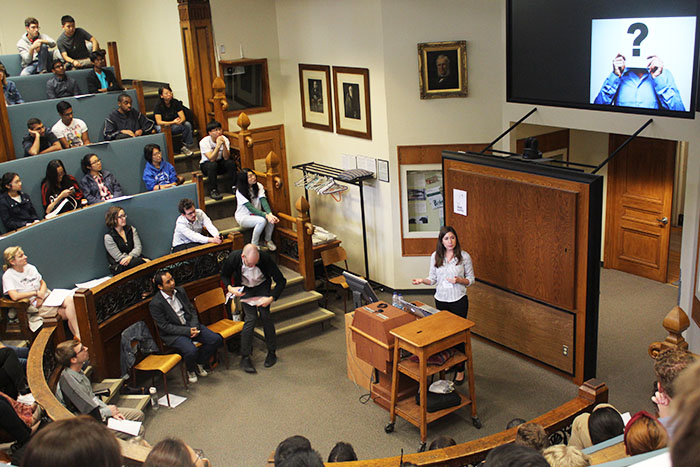For an entire week, five to six McGill professors took the stage in Redpath Museum for the 20th edition of Soup and Science. The professors, who were experts in fields varying from physics to geography, offered brief, three to five minute presentations on their work. Created by the Office of Undergraduate Research in 2005, Soup and Science has helped create a platform for students to meet professors and get acquainted with their research.
“We want to connect our students to professors,” said Victor Chisholm, who has been organizing Soup and Science since 2006. “There [are] always interested professors to share research [and] do research with students.”
While presenting ideas in such a short time can sometimes be challenging for speakers—their research is usually highly complex—ultimately, this is not the purpose of Soup and Science.
“Our goal is not to make students understand everything […] in the presentations,” Chisholm explained. “[But] to expose students to the broad selection of research in science.”
On Wednesday, Bastien Castagner, assistant professor in The Department of Pharmacology, presented his work on finding a treatment for Clostridium difficile infection. This bacteria causes inflammation and irritation of the intestines and colon, a condition known as colitis. Instead of targeting the infection for treatment, Castagner has been searching for ways to neutralize the poisonous toxins released as byproducts by the bacteria. Because it is the toxins that are responsible for the negative symptoms of the bacteria, if those are neutralized, then the bacteria presents no risk. Humans rely on a complex system of flora and fauna to digest food and finding treatments that circumnavigate the use of antibiotics is very important, explained Castagner.
On Thursday, Anna Weinberg, psychology assistant professor spoke about the correlation between childhood experiences and anxiety or depression experienced in adulthood. By exploring similarities between mental disorders in terms of onset and vulnerabilities, she’s hoping to tackle the classic ‘nurture versus nature’ debate.
Students were also offered wisdom on acquiring a research position. Dentistry professor Svetlana Komarova emphasized the importance of being persistent when applying to a lab. Even those with a lot of experience and interest may find themselves waiting a couple of months. However, those who persisted, usually succeeded.
Geography Professor Graham MacDonald, who attended Soup and Science 10 years ago as an undergraduate student, returned on Friday to speak. When responding to how it felt to participate—now as a presenter—he was happy to see how Soup and Science has grown.
“It’s really different […] but a lot of fun,” he said.
Soup and Science welcomes more aspiring audiences to its next edition in January.







